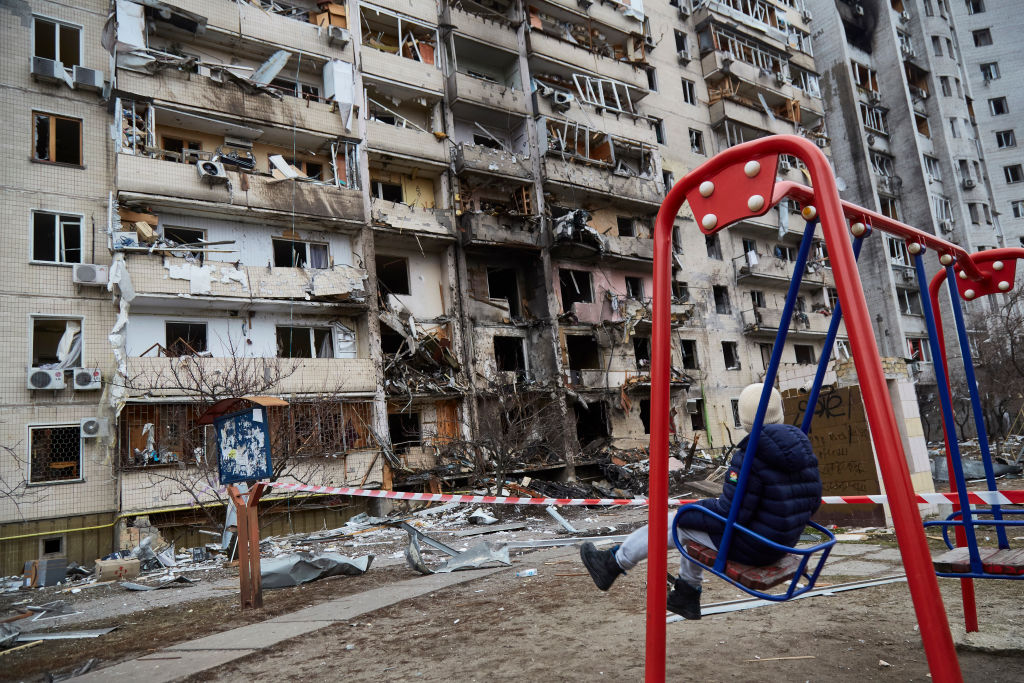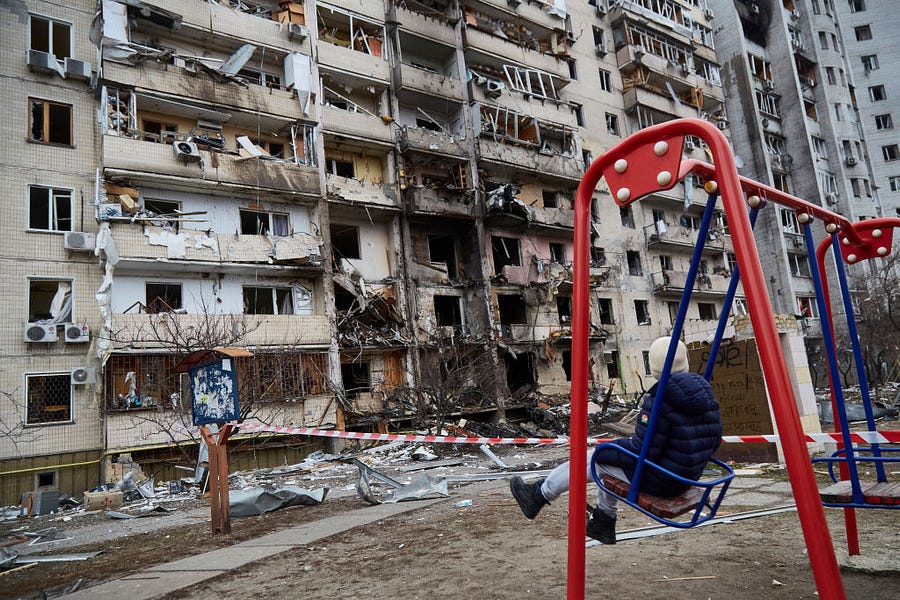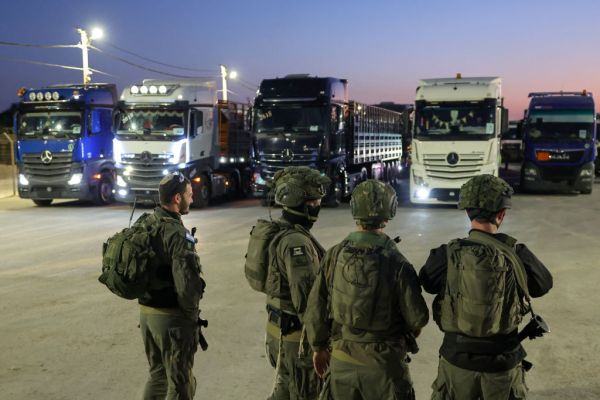Happy Thursday to everyone except MLB Commissioner Rob Manfred.
Quick Hits: Today’s Top Stories
-
The Biden administration announced another tranche of sanctions on Wednesday that includes export controls targeting Russian oil refining, full blocking sanctions on 22 Russian defense entities, and restrictions on Belarus’ ability to import technological goods. The Justice Department also announced the launch of “Task Force KleptoCapture,” an interagency effort aimed at enforcing the United States’ sanctions.
-
Pentagon spokesman John Kirby told reporters Wednesday that Defense Secretary Lloyd Austin decided to postpone a Minuteman III intercontinental ballistic missile test scheduled for this week to demonstrate the U.S. has “no intention of engaging in any actions that can be misunderstood or misconstrued.” Russian President Vladimir Putin ordered nuclear forces into “special combat readiness” earlier this week, and the country conducted nuclear submarine drills on Tuesday.
-
The January 6 Select Committee alleged in a court filing on Wednesday it has evidence that former President Donald Trump and his allies “may have engaged in criminal and/or fraudulent acts” as part of their efforts to overturn the 2020 presidential election, including obstruction of an official proceeding and conspiracy to defraud the United States.
-
The Dow Jones Industrial Average and S&P 500 increased about 1.8 percent on Wednesday after Federal Reserve Chair Jerome Powell told the House Financial Services Committee he plans to propose raising interest rates 0.25 percentage points—not 0.5 percentage points—at the Fed’s policy meeting in two weeks. “We’re going to avoid adding uncertainty to what is already an extraordinarily challenging and uncertain moment,” Powell said.
-
The European Union’s statistics agency reported Wednesday Eurozone year-over-year inflation hit 5.8 percent in February, up from 5.1 percent in January and the highest rate on record.
-
U.S. Attorney John Lausch announced the indictment of former Illinois House Speaker Michael Madigan on Wednesday. Madigan—a Democratic who held the role of Speaker for nearly 40 years—was charged with 22 counts of racketeering and bribery for his role in a corruption scandal involving ComEd, the state’s largest electric utility.
-
Senate Judiciary Committee Chair Dick Durbin announced Wednesday Judge Ketanji Brown Jackson’s Supreme Court confirmation hearings will begin on Monday, March 21. Jackson began meeting with senators—including Majority Leader Chuck Schumer and Minority Leader Mitch McConnell—yesterday.
Damage Mounts in Nonstop Shelling of Ukraine

When we last wrote to you about the situation in Ukraine on Tuesday, John Spencer, chair of Urban Warfare Studies at the Modern War Institute, told us that—although Russia’s military strategy to date had been flawed and Ukrainian forces were putting up a good fight—the violence in the conflict was about to “significantly increase.” As badly as we wanted him to be wrong, he wasn’t.
Amid reports of food and fuel shortages, Russian ground forces in Ukraine haven’t made much headway in the past two days. “There essentially has been no appreciable movement closer to [Kyiv] than what we briefed a couple of days ago,” a senior U.S. Defense Department official told reporters on Wednesday. “They appear to be stalled outside of [Chernihiv and Kharkiv] as well, and they are clearly meeting with resistance.”
Russian airstrikes, however, continue apace—and may even be accelerating in frequency. The Pentagon estimates Russian forces have launched 70 missiles in Ukraine over the past 48 hours, and on-the-ground sources indicate more and more of these projectiles are landing in residential and civilian areas.
“In Kyiv, we’ve observed, certainly as you have all observed, an increase in missiles and artillery targeting the city,” the defense official said. “This increasing aggressiveness in terms of just the iron that they’re lobbing into the city certainly aligns with open-sourced reporting that the [Russian] Ministry of Defense has decided to become much more aggressive with its targeting in Kyiv to include infrastructure right there inside the city. We’re actually seeing sort of similar situations bear out in and around Chernihiv to the north and Kharkiv to the northeast. Both cities are continuingly under assault.”
We’ll repeat once more our “fog of war” disclaimer about the difficulty of verifying on-the-ground information in a combat zone, but the imagery coming out of Ukrainian cities in recent days has been gut-wrenching. The night sky in Kharkiv lit up with artillery for minutes on end. Incredibly graphic footage depicting the aftermath of a Russian strike in Kyiv. Demolished storefronts and city centers. Strikes on or near historic government buildings, schools, hospitals, churches, and playgrounds. The Atlantic Council’s Digital Forensics Lab put together a map of all the damage done to civilian infrastructure in Kharkiv thus far.
“This attack on Kharkiv is a war crime,” Ukrainian President Volodymyr Zelensky said after one of the shellings on Tuesday. “Frank, undisguised terror. Nobody will forgive. Nobody will forget.”
The Kremlin’s response to such accusations has oscillated wildly over the past week. On the second day of the invasion, when most—but not all—of Russia’s firepower was still aimed at Ukrainian airfields and military command centers, Russian Foreign Minister Sergey Lavrov falsely claimed that “no strikes are being made on civilian infrastructure.” A few days later, Russian state TV more or less conceded non-military targets were actually being shelled in Ukraine—but claimed that “Ukraine is hitting its own and is lying to the West.” By Tuesday, Moscow had all but dropped the act.
“In order to thwart informational attacks against Russia, [Russian forces] will strike technological objects of the SBU and the 72nd Main PSO Center in Kyiv,” Russia’s Defense Ministry warned, hours before it struck a TV tower and—according to Ukrainian officials—killed five civilians. “We urge Ukrainian citizens involved by Ukrainian nationalists in provocations against Russia, as well as Kyiv residents living near relay stations, to leave their homes.”
Ukrainians didn’t need the Kremlin to tell them that. For days, thousands of Kyiv residents—mostly women and children, as men ages 18 to 60 have been conscripted into military service—have been living in the city’s subway system to shelter from the bombings overhead. With Ukrainian officials claiming Russian forces are bombarding the country’s railroad infrastructure, thousands more scrambled to find space on the remaining few trains headed West out of Kyiv.
In all, UN Commissioner Filippo Grandi estimated yesterday about one million Ukrainian refugees had fled the country in just the past seven days. A large plurality have ended up in Poland, but Hungary, Moldova, Romania, and Slovakia have opened their borders to the persecuted as well. With fuel, food, and medical supplies beginning to run low, UN officials believe that number could climb as high as five million before this is all said and done.
Estimates of civilian casualties vary dramatically depending on the source. A spokeswoman for the UN High Commissioner for Human Rights claimed the agency could confirm 136 Ukrainian civilians killed (including 13 children) and 400 Ukrainian civilians injured. “These are only the casualties we were able to cross-check,” she said. “The real toll is likely to be much higher.” How much higher? Ukraine’s State Emergency Service initially claimed 2,000 civilian deaths, but later characterized that figure as “approximate,” as it is “unknown how many people are actually still under fire and debris.”
Karim Khan, lead prosecutor at the International Criminal Court, announced yesterday he is “immediately” opening an investigation into Russia’s actions in Ukraine, claiming his office already has “reasonable basis” to believe the Kremlin has committed war crimes. World leaders have thus far been split on whether to arrive at that determination. “It’s not always clear when a civilian target gets hit whether it would be an intended target or not and whether or not they were trying to hit something close by and missed it,” the defense official said. President Biden, meanwhile, told reporters yesterday it’s “clear” Russia is targeting civilian areas, but stopped short of declaring those actions a war crime: “We are following it very closely,” he said. “It’s early to say that.”
British Prime Minister Boris Johnson, meanwhile, had no such qualms about going there. “What we have seen already from Vladimir Putin’s regime in the use of the munitions that they have already been dropping on innocent civilians, in my view, already fully qualifies as a war crime,” he said.
January 6 Committee: Trump May Have Committed Crimes
The January 6 Select Committee filed court documents Wednesday asserting former President Donald Trump may have committed crimes in connection with his attempts to remain in office after losing the 2020 presidential election. The filing—part of the committee’s effort to obtain documents from John Eastman, a law professor and Claremont Institute scholar who helped concoct an unconstitutional scheme to delay certification of the election results—urges a federal judge to review communications between Trump and Eastman and deny Eastman’s claims of attorney-client privilege.
Eastman has invoked his Fifth Amendment right not to incriminate himself in refusing to answer questions from the Committee. In seeking these communications, the Committee is arguing that they are not protected by attorney client privilege on several grounds. They argue that Eastman didn’t have an attorney/client relationship with Trump, or that if he did, that privilege was vitiated by the crime/fraud exception to the attorney client privilege.
Just as a search warrant requires an officer to swear that there is a fair probability that the search would produce evidence of a crime, in this case the committee must show that it has provided the judge “a factual basis adequate to support a good faith belief” that these communications would show that Mr. Trump committed a crime and that he relied on Eastman’s legal advice to aid his criminal efforts.
Not surprisingly, then, the committee wrote in support of their efforts to obtain these communications between Eastman and Trump that “evidence and information available to the Committee establishes a good-faith belief that Mr. Trump and others may have engaged in criminal and/or fraudulent acts,” including obstructing a congressional proceeding and defrauding the United States by obstructing a lawful governmental function.
But it’s worth noting that this isn’t the same as saying the committee has evidence they could bring to court tomorrow that would prove Trump’s guilt. The standard that the committee has to meet—and alleges here—is much lower than that. It is only that they have a good faith belief that Trump could have violated one of these statutes and that the communications between Eastman and Trump could help them prove it.
In support of that argument, the committee filing presents a detailed chronology of the alleged conspiracy by piecing together evidence from a variety of sources, including committee depositions of key witnesses, prosecutions of January 6 rioters, court decisions related to Trump’s false claims of election fraud, and journalistic accounts of the events surrounding the former president’s campaign to overturn the election results. Trump, the committee alleges, engaged in a lengthy effort to convince his supporters that the election was stolen despite having been told, repeatedly and authoritatively, that he lost. Jason Miller, a senior Trump campaign adviser, told the committee in a deposition that “soon after the election, a campaign data expert told the president ‘in pretty blunt terms’ that he was going to lose.”
Acting Attorney General Jeffrey Rosen and Acting Deputy Assistant Attorney General Richard Donoghue, the committee asserts, “discussed allegations of voter fraud with President Trump on multiple occasions in December of 2020—and informed him, both as to specific allegations and more generally, that the President’s claims of massive fraud sufficient to overturn the election were not supported by the evidence.” Rosen described a December 15, 2020, meeting at the White House with top Trump advisers, including White House Counsel Pat Cippollone and chief of staff Mark Meadows, in which the participants warned Trump that “people are telling you things that are not right.”
The committee filing reveals Donoghue testified that he “personally informed the President on a December 27, 2020 phone call ‘in very clear terms’ that the Department of Justice had done ‘dozens of investigations, hundreds of interviews,’ had looked at ‘Georgia, Pennsylvania, Michigan, Nevada’ and concluded that ‘the major allegations are not supported by the evidence developed.’” Other top government officials and agencies—from Attorney General Bill Barr to the Cybersecurity and Infrastructure Security Agency—had come to the same conclusion and shared those views publicly.
Despite this, the committee alleges, Eastman was the “architect” of a plot with Trump and his key allies to delay the certification of the election on January 6. On that day, Eastman and Trump both spoke to the Stop the Steal rally on the mall before the gathering moved to the Capitol and turned violent. At 2:24 p.m., Trump tweeted: “Mike Pence didn’t have the courage to do what should have been done to protect our Country and our Constitution, giving States a chance to certify a corrected set of facts, not the fraudulent or inaccurate ones which they were asked to previously certify. USA demands the truth.” According to the filing, “the evidence obtained by the Select Committee indicates that President Trump was aware that the violent crowd had breached security and was assaulting the Capitol when Mr. Trump tweeted. The evidence will show that rioters reacted to this tweet, resulting in further violence at the Capitol.”
Worth Your Time
-
Vladimir Putin wants the West to believe he’s open to using nuclear weapons. President Biden says not to worry. “The Russian invasion of Ukraine has politicians and policymakers talking about something that would have been almost unimaginable as recently as a month ago: the specter that a ground war in Eastern Europe could escalate into a nuclear conflict,” writes Eric Felten at RealClearPolitics. “Russian strongman Vladimir Putin has created an urgent need for what had seemed to be a dusty relic—a strategy for what to do with nuclear weapons. It’s possible the answer may be found in a short policy paper that helped John F. Kennedy blunt Russian ambitions in 1961 when Nikita Khrushchev tested the new American president by threatening to make good on his demand that West Berlin be handed over to the Soviets.” Kennedy advisers would later say the two-page paper, written by Thomas Schelling, made a “deep impression” on Kennedy and shaped his response to the crisis.
-
Russia House—a D.C. restaurant—was targeted by vandals last week who smashed windows, broke a door, and tagged walls with anti-Russian rhetoric. The restaurant’s owners are American and Lithuanian. But even if they weren’t, Christian Britschgi notes for Reason, it’s vital we distinguish Russian people from Vladimir Putin’s autocratic regime. “What’s so concerning about the ever-widening cultural boycott of Russia and Russians,” he writes, “is that it’s punishing people with little connection to and no influence over the Russian government and its war in Ukraine. That probably won’t change the course of Russia’s war against Ukraine—and when the war does end, the world will have a lot fewer cultural ties to sustain whatever fragile peace emerges.”
-
As if on cue, Politico’s Nahal Toosi is out with an article detailing the Biden administration’s efforts—both overt and covert—to drive a wedge between Putin and the Russian people. “Russia’s pro-democracy movement is weaker than it’s been in the past. Putin has killed, imprisoned or pushed into exile many of the most skilled Russians willing to stand up to him, including [Alexei] Navalny. And U.S. officials are unwilling to say much about what covert methods they are using to weaken Putin’s grasp on power, especially when it comes to the oligarchs,” she writes. Former U.S. officials, however, say such moments are ripe for a country like the United States to penetrate Putin’s inner circle as well as to recruit informants from within Russia’s bureaucracy. ‘There are doubtless prominent elites who will have little stomach for the moral or financial bankruptcy of the Kremlin’s moves here,’ said Gavin Wilde, a former National Security Council official who dealt with Russia. He agreed that the ‘nameless rank-and-file are probably ripe for recruitment,’ but said it might be hard for U.S. officials to reach them given restraints the Kremlin is reported to have put on their travel.”
Presented Without Comment
Also Presented Without Comment
Toeing the Company Line
-
Georgetown professor of international affairs Paul Miller joined Jonah on The Remnant yesterday for a conversation about Russia’s invasion of Ukraine and the difference between patriotism and nationalism. Has Putin always been this crazy? How should America be preparing itself for a new Cold War?
-
On Wednesday’s Dispatch Podcast, Steve spoke with Sen. Ben Sasse about President Biden’s State of the Union address and what else the United States should be doing to help Ukraine. Then, former GOP Rep. Barbara Comstock dropped by for a conversation about the future of the Republican Party.
-
Jonah has some gripes with the State of the Union. Joe Biden’s, yes, but also the entire concept of the address. “It’s way too monarchical, promoting the presidency above Congress, at least symbolically,” he writes in Wednesday’s G-File (🔒). “Remember, the State of the Union was intended to be a mandatory performance update from essentially an underling.”
-
In this week’s Capitolism (🔒), Scott pulls together some of his early observations on the economic impact of Russia and Ukraine. “There’s a lot more to the situation than just these bilateral trade and capital flows [between the U.S. and Russia],” he notes. But Russia and Ukraine are major energy and grain exporters, and, “though most of these supplies go to places other than the United States, global commodities markets are—well—global, meaning that real or anticipated reductions in supplies of these commodities in one place can lead to higher prices in others.”
-
Spoiler alert: Not everything President Biden said in his State of the Union address was 100 percent truthful. Alec and Khaya break it all down in their latest Fact Check.
Let Us Know
Though Francis Scott Key’s lyrics had been in use for decades, it was on this day in 1931 that President Herbert Hoover signed H.R. 14 into law, formally designating “The Star-Spangled Banner” as the United States’ national anthem. If you were tasked with coming up with a more modern replacement, what song would you recommend?
Reporting by Declan Garvey (@declanpgarvey), Charlotte Lawson (@lawsonreports), and Steve Hayes (@stephenfhayes).





Please note that we at The Dispatch hold ourselves, our work, and our commenters to a higher standard than other places on the internet. We welcome comments that foster genuine debate or discussion—including comments critical of us or our work—but responses that include ad hominem attacks on fellow Dispatch members or are intended to stoke fear and anger may be moderated.
You are currently using a limited time guest pass and do not have access to commenting. Consider subscribing to join the conversation.
With your membership, you only have the ability to comment on The Morning Dispatch articles. Consider upgrading to join the conversation everywhere.